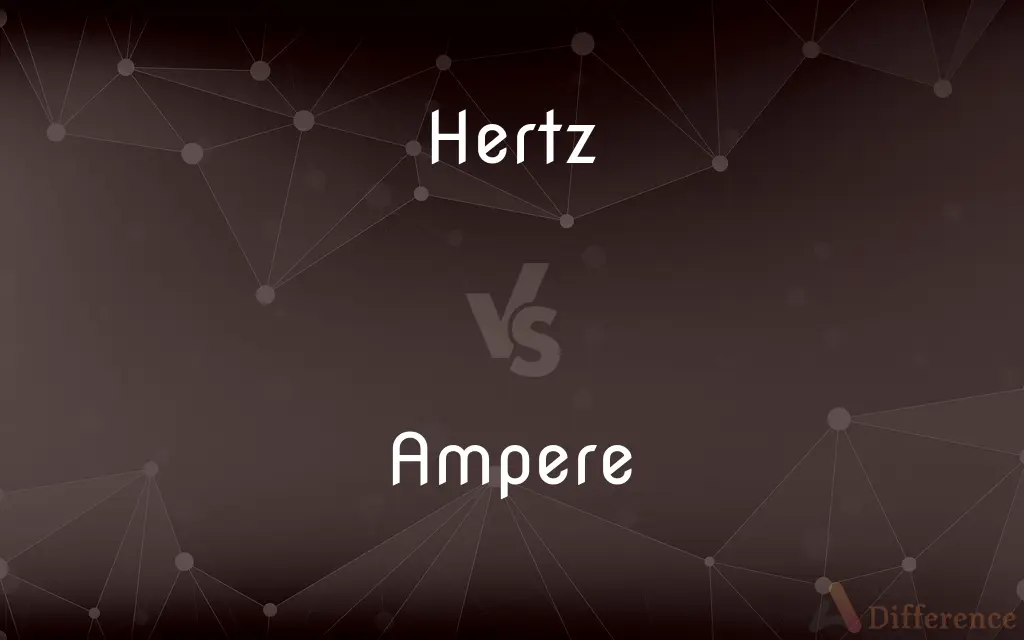Hertz vs. Ampere — What's the Difference?
Edited by Tayyaba Rehman — By Maham Liaqat — Updated on March 8, 2024
Hertz measures frequency, indicating cycles per second in waveforms, while Ampere measures electric current, representing the flow of electric charge.

Difference Between Hertz and Ampere
Table of Contents
ADVERTISEMENT
Key Differences
Hertz (Hz) is the unit of frequency in the International System of Units (SI), used to quantify the number of cycles per second of a periodic wave, such as sound waves, light waves, or electrical signals. On the other hand, Ampere (A), also an SI unit, measures the amount of electric current, specifically the flow of electric charges through a surface at the rate of one coulomb per second.
Frequency, as measured in hertz, is a fundamental property of both physical and abstract waves, describing how often the wave cycles or repeats itself within a second. Ampere, however, quantifies the electric current's strength, indicating how many electric charges are passing a point in a circuit per unit of time, and is a direct measure of the electrical flow's intensity.
While hertz is used across various fields, including acoustics, radio, and electronics, to describe oscillations and vibrations, ampere is crucial in electrical engineering and physics to understand and manage the flow of electricity through conductors. The application of hertz is broad, extending beyond electricity to any phenomena that oscillate or repeat regularly over time, whereas ampere is specifically tied to the behavior and analysis of electrical circuits.
The concept of frequency and the use of hertz are critical in designing and analyzing systems that involve waveforms, such as telecommunications, audio technology, and signal processing. In contrast, understanding and measuring amperes is essential for the safe and efficient design of electrical systems, including power distribution, electrical appliances, and electronic devices, highlighting its importance in practical applications and safety standards.
Hertz and ampere measure fundamentally different properties: hertz focuses on the rate at which a waveform repeats, without concern for the waveform's power or energy content, while ampere deals directly with the quantity of electrical charge moving, which is directly related to the electrical power (when combined with voltage) and the potential for doing work or causing effects in electrical systems.
ADVERTISEMENT
Comparison Chart
Measurement
Frequency of cycles per second.
Electric current flow of charge per second.
Unit Type
SI unit for frequency.
SI unit for electric current.
Application
Used in acoustics, radio, and electronics.
Essential in electrical engineering and physics.
Reflects
How often a wave repeats itself within a second.
Strength of electrical flow through a conductor.
Importance
Critical in designing systems with waveforms.
Vital for the design and safety of electrical systems.
Compare with Definitions
Hertz
Universal in wave analysis.
Earthquakes are measured in terms of frequency of ground oscillations.
Ampere
Measures electric current.
A standard USB charger might output 2 amperes.
Hertz
Independent of wave energy.
Light and sound waves can have the same frequency but differ in energy.
Ampere
Specific to electric phenomena.
The magnetic field strength around a wire increases with the current in amperes.
Hertz
Applies to various waves.
The CPU operates at gigahertz (GHz) frequencies.
Ampere
Essential for electrical safety.
Circuit breakers are rated in amperes to prevent overload.
Hertz
Indicates speed of oscillation.
A 60 Hz frequency means 60 cycles per second.
Ampere
Directly related to charge flow.
Higher amperes indicate a greater flow of electric charges.
Hertz
Unit of frequency.
The radio station broadcasts at 98.7 megahertz (MHz).
Ampere
Influences power and energy.
Electrical power is calculated as voltage times current in amperes.
Hertz
The hertz (symbol: Hz) is the derived unit of frequency in the International System of Units (SI) and is defined as one cycle per second. It is named after Heinrich Rudolf Hertz (1857-1894), the first person to provide conclusive proof of the existence of electromagnetic waves.
Ampere
The ampere (, US: ; symbol: A), often shortened to amp, is the base unit of electric current in the International System of Units (SI). It is named after André-Marie Ampère (1775–1836), French mathematician and physicist, considered the father of electromagnetism.
Hertz
The SI unit of frequency, equal to one cycle per second.
Ampere
The basic unit of electric current, equal to one coulomb per second and equivalent to the current, flowing in two straight parallel wires of negligible cross section separated by a distance of one meter, that produces a force between the wires of 2.0 × 10-7 newtons per meter of length. The value of an ampere in the International System differs very slightly from that in the meter-kilogram-second-ampere system of units. See Table at measurement.
Hertz
A unit of frequency equal to one cycle per second. See Table at measurement.
Ampere
A unit of electrical current, the standard base unit in the International System of Units; colloquially amp. Abbreviation: amp, Symbol: A
Definition: The ampere, symbol A, is the SI unit of electric current. It is defined by taking the fixed numerical value of the elementary charge e to be 1.602
X 10−19 when expressed in the unit C, which is equal to A
S, where the second is defined in terms of ΔνCs. ([https://www.bipm.org/en/si-base-units/ampere The International Bureau of Weights and Measures])
Hertz
In the International System of Units, the derived unit of frequency; one (period or cycle of any periodic event) per second. Symbol: Hz
Ampere
The unit of electric current; - defined by the International Electrical Congress in 1893 and by U. S. Statute as, one tenth of the unit of current of the C. G. S. system of electro-magnetic units, or the practical equivalent of the unvarying current which, when passed through a standard solution of nitrate of silver in water, deposits silver at the rate of 0.001118 grams per second. Called also the international ampère.
Hertz
A unit of frequency equal to one cycle per second; it is abbreviated Hz. It is commonly used to specify the frequency of radio waves, and also the clock frequencies in digital computers. For these applications, kilohertz and megahertz are the most commonly used units, derived from hertz.
Ampere
A former unit of electric current (slightly smaller than the SI ampere)
Hertz
The unit of frequency; one Hertz has a periodic interval of one second
Ampere
The basic unit of electric current adopted under the Systeme International d'Unites;
A typical household circuit carries 15 to 50 amps
Hertz
German physicist who was the first to produce electromagnetic waves artificially (1857-1894)
Hertz
German physicist who with James Franck proved the existence of the stationary energy states postulated by Bohr (1887-1975)
Common Curiosities
What does hertz measure?
Hertz measures the frequency of cycles per second in a periodic wave.
Can hertz and ampere be directly compared?
No, they measure different properties: hertz measures frequency, while ampere measures electric current.
What does ampere measure?
Ampere measures the flow of electric charge per second, indicating electric current strength.
Why is the ampere important in electrical circuits?
The ampere is crucial for determining the electrical current's strength, essential for circuit design, safety, and efficiency.
What role does ampere play in power consumption?
Amperes, combined with voltage, determine power consumption, influencing energy usage and costs.
How are hertz used outside of electricity?
Hertz is used to describe any periodic phenomena, including sound and light waves, not just electrical signals.
How do engineers use amperes in designing electrical appliances?
Engineers design appliances based on the amperes they draw to ensure compatibility with household electrical systems and safety standards.
Can the measurement of amperes prevent electrical hazards?
Yes, measuring and controlling amperes can prevent overloads and short circuits, reducing the risk of fire and equipment damage.
How do hertz affect electronic devices?
Devices operate at specific frequencies, which can affect their efficiency, speed, and functionality.
How do hertz relate to the digital world?
Hertz determine the speed of digital processors and communication frequencies, affecting performance and data transfer rates.
What is the relationship between hertz and signal processing?
In signal processing, hertz help determine the signal's bandwidth and frequency response, crucial for communication systems.
Do hertz influence the energy of a wave?
While hertz measure frequency, the wave's energy also depends on amplitude and the medium's properties, not just frequency.
Is there a physical limit to hertz or ampere measurements?
Theoretically, hertz can range from zero to infinity, but practical limits exist based on technology and materials. Amperes are limited by the capacity of conductors and safety standards.
How does the understanding of hertz and ampere impact everyday technology use?
Knowledge of hertz and ampere helps in choosing appropriate devices and services (like internet speed or electrical appliances) for personal needs, ensuring efficiency and safety.
What determines the maximum amperes a device can handle?
The maximum amperes are determined by the device's design, including its wiring and components' capacity to handle electric current without overheating or failing.
Share Your Discovery

Previous Comparison
Reset vs. Restart
Next Comparison
Outdegree vs. IndegreeAuthor Spotlight
Written by
Maham LiaqatEdited by
Tayyaba RehmanTayyaba Rehman is a distinguished writer, currently serving as a primary contributor to askdifference.com. As a researcher in semantics and etymology, Tayyaba's passion for the complexity of languages and their distinctions has found a perfect home on the platform. Tayyaba delves into the intricacies of language, distinguishing between commonly confused words and phrases, thereby providing clarity for readers worldwide.
















































